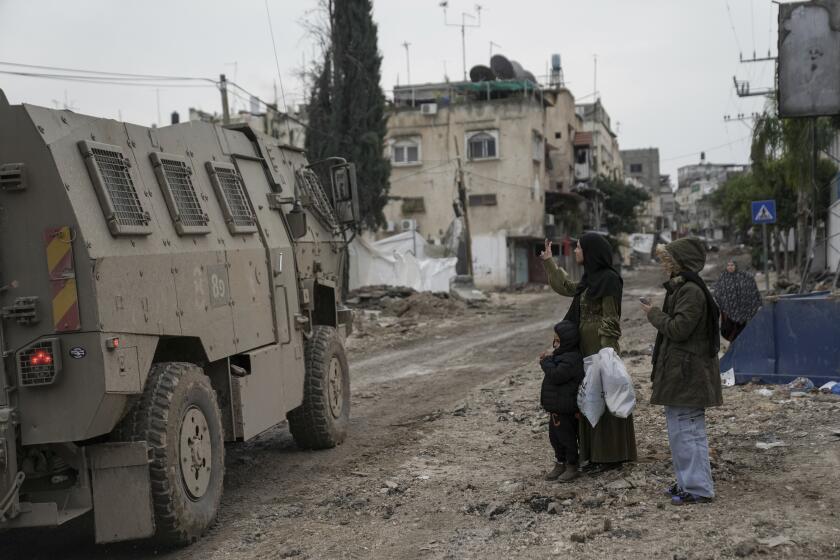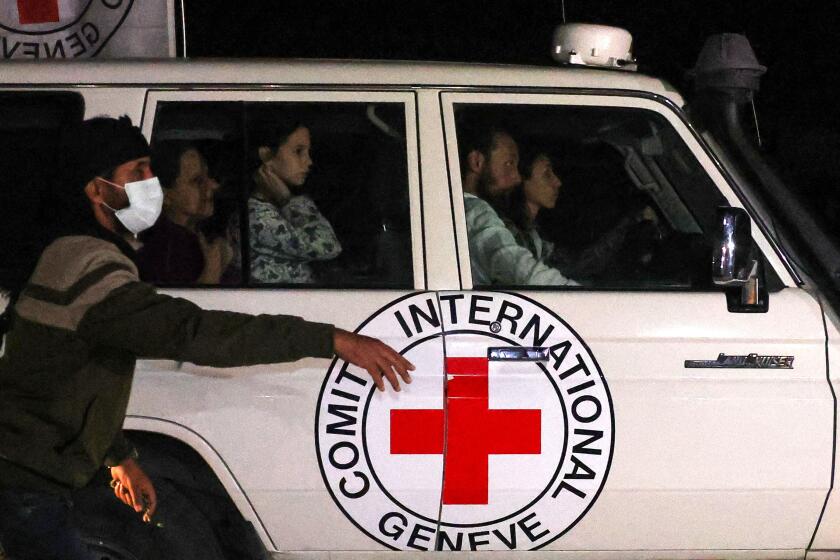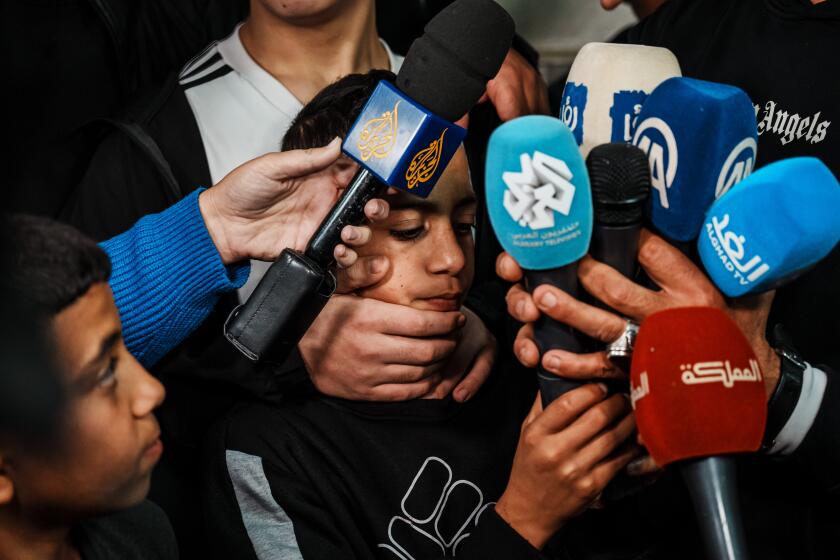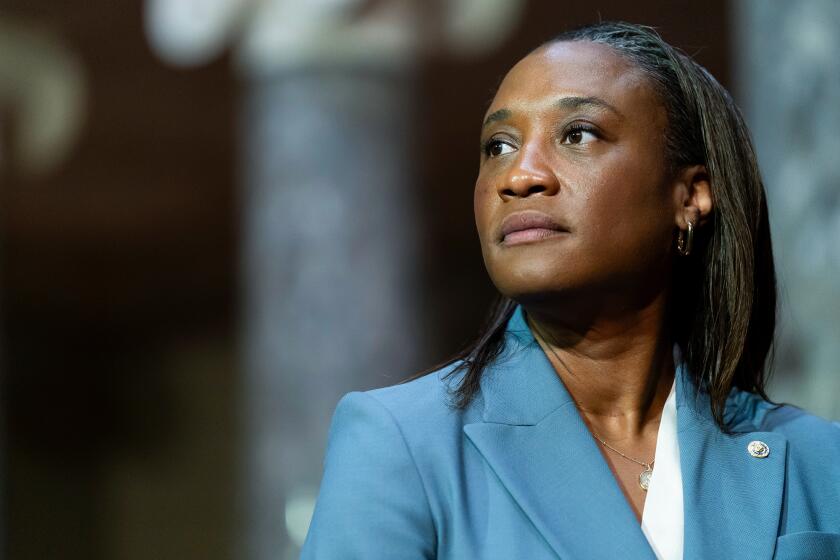Saudi Arabia says it won’t recognize Israel without a path to a Palestinian state

- Share via
JERUSALEM — Saudi Arabia’s top diplomat says the oil-rich kingdom will not normalize relations with Israel or contribute to Gaza’s reconstruction without there being a credible pathway to a Palestinian state — a nonstarter for Israel’s government.
Prince Faisal bin Farhan’s remarks in an interview with CNN that was broadcast late Sunday were some of the most direct yet from Saudi officials.
Israeli Prime Minister Benjamin Netanyahu — who faces mounting domestic pressure over the plight of Israeli hostages, including an angry protest inside a parliamentary committee meeting Monday — has rejected Palestinian statehood and described plans for open-ended military control over Gaza.
The dispute over Gaza’s future, as the war still rages with no end in sight, pits the U.S. and its Arab allies against Israel and poses a major obstacle to any plans for postwar governance or reconstruction of the impoverished coastal enclave, which is home to 2.3 million Palestinians.
Before the Oct. 7 Hamas attack on Israel that triggered the war, the U.S. had been trying to broker a landmark agreement in which Saudi Arabia would normalize relations with Israel in exchange for U.S. security guarantees, aid in establishing a civilian nuclear program in the kingdom and progress toward resolving the Israeli-Palestinian conflict.
In September, Netanyahu had said Israel was on “the cusp” of such a deal, which he said would transform the Middle East.
The Palestinian death toll from the war between Israel and Hamas reportedly passes 25,000. Israel announces the death of Sgt. Shay Levinson in Gaza.
In the interview on “CNN’s Fareed Zakaria GPS,” the host asked: “Are you saying unequivocally that if there is not a credible and irreversible path to a Palestinian state, there will not be normalization of relations between Saudi Arabia and Israel?”
“That’s the only way we’re going to get a benefit,” Prince Faisal said. “So, yes.”
Earlier in the interview, when asked if Saudi Arabia would finance reconstruction in Gaza — where Israel’s offensive has caused unprecedented destruction — Prince Faisal gave a similar answer.
“As long as we’re able to find a pathway to a solution, a resolution, a pathway that means that we’re not going to be here again in a year or two, then we can talk about anything,” he said. “But if we are just resetting to the status quo before Oct. 7, in a way that sets us up for another round of this, as we have seen in the past, we’re not interested in that conversation.”
Opinions on how to handle the war against Hamas in the Gaza Strip are emerging among senior Israeli officials as the fighting drags on in the enclave.
The Palestinians seek a state that would include Gaza, the Israeli-occupied West Bank and annexed East Jerusalem, territories Israel captured in the 1967 Mideast War.
Israel views all of Jerusalem as its capital and the West Bank as the historical and biblical heartland of the Jewish people. It has built scores of settlements across both territories that are home to hundreds of thousands of Jewish settlers. The last of several rounds of peace talks broke down nearly 15 years ago.
At a meeting Monday on the war, European Union foreign ministers said the creation of a Palestinian state was the only way to achieve peace, and expressed concern about Netanyahu’s rejection of the idea.
The current war between Israel and Hamas — the fifth and by far the deadliest — began when Palestinian militants broke through Israel’s defenses and rampaged through several nearby communities, killing some 1,200 people, mostly civilians, taking around 250 people hostage and shattering Israelis’ sense of security.
President Biden marked the 100th day in captivity for hostages of Hamas without mentioning the 24,000 Palestinians killed by Israel in that time.
Israel’s offensive has killed at least 25,295 Palestinians in Gaza and wounded more than 60,000, according to the Health Ministry in the Hamas-ruled territory. The ministry does not distinguish between civilians and combatants but says around two-thirds of those killed were women and children.
Medics reported heavy fighting in the southern city of Khan Yunis, saying dozens of dead and wounded people were brought to the city’s already-overwhelmed Nasser Hospital. Families could be seen fleeing south, to areas already packed with hundreds of thousands of displaced people.
The Israeli military says it has killed around 9,000 militants, without providing evidence, and blames the high civilian death toll on Hamas because it positions fighters, tunnels and other militant infrastructure in dense residential areas.
Some 85% of Gaza’s population of 2.3 million have fled their homes, seeking elusive shelter in the south as Israel continues to strike all parts of the enclave. United Nations officials say 1 in 4 people in Gaza are starving as the fighting and Israeli restrictions hinder the delivery of humanitarian aid.
The recent hostage-for-prisoner swaps between Hamas and Israel have focused attention on the number of Palestinian minors imprisoned by Israel.
The war has also stoked tensions across the region, with Iran-backed groups in Lebanon, Syria, Iraq and Yemen attacking Israeli and U.S. targets.
Netanyahu has vowed to continue the offensive until “complete victory” over Hamas and the rescue of all remaining hostages after more than 100 were released in a cease-fire deal in November in exchange for scores of Palestinians imprisoned by Israel.
But Israelis are increasingly divided on the question of whether it’s possible to accomplish both of Netanyahu’s stated goals.
Hamas is believed to be holding the hostages in tunnels deep underground and using them as shields for its top leaders. Israel has successfully rescued only one hostage, while Hamas says several have been killed in Israeli airstrikes or during failed rescue operations. Those claims could not be independently confirmed.
Start your day right
Sign up for Essential California for the L.A. Times biggest news, features and recommendations in your inbox six days a week.
You may occasionally receive promotional content from the Los Angeles Times.
On Monday, dozens of family members of the hostages stormed into a Finance Committee meeting in Israel’s parliament, yelling: “You won’t sit here while they are dying there!” Some had to be physically restrained as they shouted at the lawmakers, and at least one person was escorted out.
Moshe Gafni, the chair of the committee, said he understood the protesters’ pain and called for a break from the meeting, which was in the process of approving budgets for communities near Gaza.
Families of the hostages, as well as other protesters, have set up a tent camp outside Netanyahu’s residence in Jerusalem and vowed to remain until a deal is reached to bring the rest of the hostages home. Other protests have called for new elections.
Hamas has said it will free more captives only in exchange for an end to the war and the release of thousands of Palestinian prisoners. Netanyahu has ruled out such an agreement and says military pressure is key to securing the release of more hostages.
Sen. Laphonza Butler discusses America’s challenges and the next presidential election, the war in Gaza and what she hopes to accomplish in office.
The long-serving prime minister, whose popularity has plummeted since Oct. 7, faces pressure from the U.S. — Israel’s top ally — to shift to more precise military operations, do more to facilitate humanitarian aid and embrace postwar plans with broad support across the region.
But Netanyahu’s governing coalition is beholden to far-right parties that want to step up the offensive, encourage the “voluntary” emigration of hundreds of thousands of Palestinians from Gaza and reestablish Jewish settlements there.
More to Read
Sign up for Essential California
The most important California stories and recommendations in your inbox every morning.
You may occasionally receive promotional content from the Los Angeles Times.


















